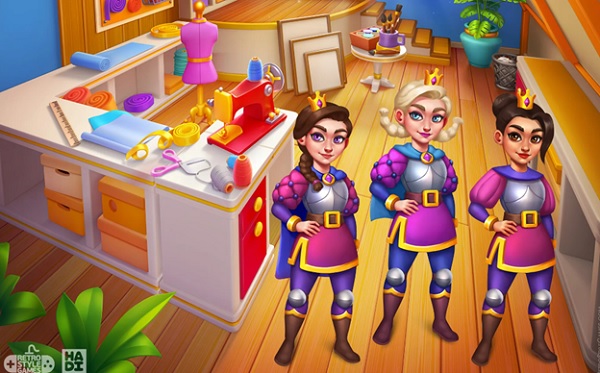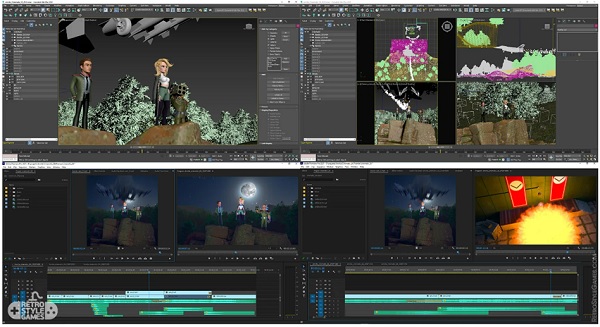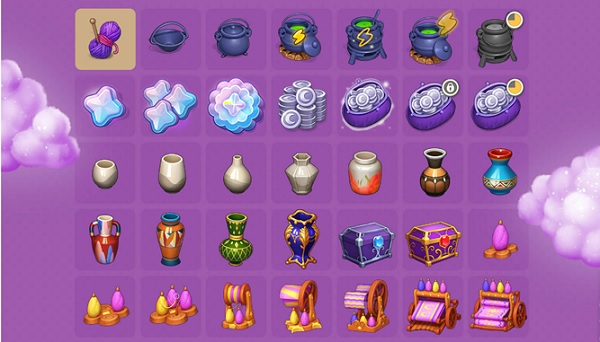The gaming industry has seen a significant surge, especially during the COVID pandemic. With people spending more time indoors, video games have become a primary source of entertainment.
As the industry grows, there’s a rising interest in understanding the earnings of game designers and the benefits of outsource mobile game development.
How much do Game Designers Make in a year?
Video game designers are the creative minds behind the games we love. They conceptualize, design, and sometimes even code the games. Their earnings can vary based on several factors:
- Employment Type: Independent game designers might earn differently than those employed full-time by a game studio.
- Experience: Senior game designers with years of experience can command higher salaries. For instance:
○ 0 to 5 years: $56,000
○ 5 to 10 years: $71,000
○ 10 to 20 years: $79,000
○ 20 or more years: $98,000 - Industry Averages: As of May 2023, the average wage for game designers was $86,560 a year. Those working for software publishers averaged $93,180, while those in computer systems design averaged $85,640.
How Many Hours Do Game Developers Work? A Closer Look
For many in the gaming industry, the term “crunch time” is all too familiar. It refers to the intense periods leading up to a game’s release, where developers might find themselves working long hours to meet tight deadlines.
But how prevalent is this practice, and what does the average workweek look like for a game developer?
According to the GDC’s State of the Game Industry 2021 report, most game developers worked a reasonable number of hours weekly over the past year. However, a small percentage did report working over 56 hours weekly.
When asked about the maximum hours they worked in any given week, 24% said they worked more than 66 hours, with 9% working over 81 hours.
Interestingly, when developers were asked why they worked such long hours, 73% said it was self-imposed. They felt a personal motivation to work longer.
Only 14% attributed it to management pressure, and 11% felt peer pressure.
Benefits of Game Development Outsourcing
Outsourcing in game development refers to delegating tasks to external studios or experts.
Here are the TOP 10 benefits:
1) Rapid Development:
With more hands on deck, projects are completed faster. Rapid Development is the process of speeding up the game creation process. By having more team members or experts working on a project, it can be completed in a shorter time.
When you outsource, you bring in external experts or teams to work on specific parts of your game. This means you have more people working on the project, leading to faster completion.
Example: Imagine you’re creating a match-3 game. If you have four game developers, it might take six months. But if you hire four more game developers from an outsourcing game art company, the house might be ready in just three months.

2) Scalability:
Scalability refers to the ability to easily change the size of your team based on the needs of your project. Outsourcing offers flexibility. If a part of your game requires special skills or more workforce, you can hire an external team for that period. Once the task is done, you can scale down.
Going back to the match-3 game example, let’s say you’ve finished the basic game structure with eight game developers. Now, you need detailed character design, but only two game developers are needed for this.
Instead of keeping all eight, you can just work with the two experts, adjusting your team size based on the task at hand.

3) Cost-Effective:
Access expertise without the overhead costs of full-time employees. Being cost-effective means getting the best value for your money. In game development, it’s about producing quality games without overspending.
Outsourcing allows you to hire experts or teams only when you need them. Instead of having a full-time team, you can bring in specialists for specific tasks. This means you only pay for the work done, reducing overhead costs.
Imagine you’re making a CGI trailer, but you only need to make it once. Instead of buying all the video tools, you hire outsourced game experts with their tools to do it for you. You get a high-quality CGI trailer without the extra cost of tools you won’t use again.

4) Team Collaboration:
Outsourcing promotes teamwork and effective communication. Team collaboration is when different people or teams work together, combining their skills to achieve a common goal.
Outsourcing introduces new perspectives and skills to your project. External teams can bring fresh ideas and expertise that your in-house team might not have. Plus, with modern communication tools, collaborating with an outsourced team is as easy as working with your in-house team.
5) Flexibility:
Flexibility in game development means being able to change or adjust your resources based on the needs of your project. Outsourcing offers the freedom to scale your team up or down based on your current project requirements. Instead of being locked into a fixed team size, you can bring in more developers for big projects and reduce the team to smaller ones.
6) Specialized Services:
Access to a wide range of experts in specific areas of game development. Specialized services refer to very specific skills or expertise in game development.
Outsourcing gives you access to a vast pool of experts from different areas of game development. Whether you need a 3D animator, a sound engineer, or an AI programmer, you can find the right expert without hiring them full-time.
Think of making a puzzle game. Your main team might be great at 3D modeling, but you need a 2D artist for making game icons. Instead of hiring a full-time 2d artist, you bring one in just for that song. Outsourcing in game development works the same way, allowing you to bring in experts only when their specific skills are needed.

7) Risk Management:
Quickly replace or augment team members as needed. Risk management involves planning for potential problems in your project and finding ways to avoid or deal with them.
One of the main risks in game development is having the wrong team size or skills. Outsourcing lets you quickly change your team members based on your needs. If someone isn’t a good fit or if you need a different skill set, you can easily replace or add team members.
Imagine you’re baking a cake and realize you’re missing an ingredient. Instead of starting over or trying to make do, you can quickly run to the store and get what you need. In game development, outsourcing is like having a store nearby. If you’re missing a skill or need to change your team, you can do it quickly without starting over.
8) Advanced Technology:
Use the latest tools and technologies without the upfront investment. Outsourcing allows you to use the newest tools without buying them yourself. The companies you outsource to will have the latest technology and can provide the expertise to use them effectively.
Think of it like watching a movie. Instead of buying an expensive home theater system, you can go to a cinema that has the latest equipment. In game development, outsourcing is like going to the cinema. You get access to the best tools and experts without the high costs.
9) Market Expansion:
Gain insights from global teams and expand your reach. Outsourcing game development allows companies to tap into global talent. This means you can get insights from teams around the world, which can help you understand different markets better.
For instance, A US-based game company wants to create a game for the Asian market. By outsourcing to a team in Asia, they can get direct insights into local preferences, cultural nuances, and gameplay styles that resonate with that audience.
10)Time Management:
When you outsource, you free up your internal team. This means they can focus on what they do best, whether it’s marketing, strategy, or other core business tasks. Outsourcing handles the heavy lifting of game development, allowing your team to manage their time better.
Example: A company has a brilliant marketing team but a limited development team. Instead of overloading the development team with work, the company outsources game development. This allows the marketing team to focus on promoting the game while the development is handled by experts elsewhere.
How Much Does it Cost to Outsource Mobile Game Development?
The cost associated with outsourcing can vary based on numerous factors.
The location of the development team plays a significant role in determining the cost. For instance, hiring developers in the US or Western Europe is generally more expensive ($140 per hour on average) than in countries like Ukraine (around $35- $55 per hour) or India ($15 – $40 per hour).
However, it’s essential to consider cultural and language differences when choosing a location.
The nature of the game, its features, and its complexity can significantly influence the cost. A game with a simple interface will be less expensive than one requiring complex 3D modeling and a game engine.

Developing a game for multiple platforms (iOS, Android, web browsers) can increase the cost compared to focusing on a single platform.
As well as multiple platforms, games with complex backend infrastructures or those that integrate multiple APIs can be more expensive to develop.
MOBILE GAME ART: ALL NUANCES EXPLAINED
If you are into starting a game development company, you may be curious to learn why some games receive acclaim while others stay on the back burner. The answer is behind the production process. The designers and artists must be capable of making original games and aim to provide innovative gameplay quality. In addition, the mobile game design includes a user-friendly interface, impressive gaming style, colors, graphics, and other interactive segments for users’ fantastic experience.
Parallelly, mobile game design is to be intuitive and effortless. Indeed, players cannot fully enjoy the game with a sophisticated and awkward setup. Moreover, it is tricky to manage for artists because of the small screen size compared with PCs.
So what to take into account when developing engaging and user-friendly games? To improve the playability of games, including the following steps in the game development process has no alternative.
EXPLORE YOUR USERS TO MAKE THE GAME HIT THE TARGET
Without defining your target audience, you are unlikely to succeed even with a highly experienced team. You are supposed to learn everything to help you better know users’ needs, expectations, and how they interact with your game. For example, you may research similar mobile game genres of your competitors and use that knowledge to create a more satisfactory app.
AVOID UNNECESSARY FEATURES THAT DISTRACT USERS’ ATTENTION
Mobile game developers must form comprehensive art decisions.
How come? A single developer should remember that users are often distracted from games because of the calls or poor internet. The designer’s task here is to consider additional features that can keep users playing further.
KEEP THE INTERFACE SIMPLE AND CLEAR
If the interface development process result is appealing and functional, then you handled one of the keys to success.
Analyze the most important functions and avoid unwanted content, extra icons, or options.
CREATE A UI ACCESSIBLE TO EVERYONE
If UI designers strive to create an impeccable interface, they must weigh the interests of most mobile game players. Then, for users’ convenience, adapt game engines, pop-up windows, and other functions to your figures to create a pleasant interface for the majority.
GATHER PLAYERS’ FEEDBACK TO REFINE THE GAME
Players expect every character or element to react to their activities. Therefore, the experienced team aims to ensure that the user receives feedback after acting. It means that a change should accompany every touch. For example, game elements may give feedback physically or visually. Use the one that matches the game best.
TEST YOUR DESIGN, ITERATE, AND REPEAT
Game designers should also carefully consider the overall appearance and development experience. Typically, even a visually perfect and thoughtful design will reveal its invisible imperfections when put into production. That’s why it’s crucial to test the game with real players on various devices to ensure it surpasses all expectations. Later use the gathered data to improve the entire process.

Wrapping Up
The gaming industry is profitable and game developers earn decent salaries depending on their experience and expertise. With the increasing demand for high-quality games, outsourcing has become a viable solution for many game development companies. This combination of cost-effectiveness, expertise, and flexibility makes it attractive to both start-ups and established companies.




